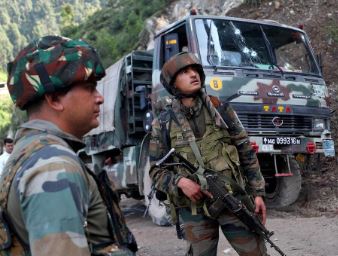Confronting J&K Terror: Strategic Imperatives and Diplomatic Dilemmas
In recent days, Jammu and Kashmir (J&K) has once again been gripped by tragedy as seven brave security personnel succumbed to terror attacks, underscoring a grim reality: Pakistan’s persistent sponsorship of terrorism remains a daunting challenge. These incidents, occurring in close succession to previous assaults, serve as stark reminders of the unresolved threat posed by Pakistan-sponsored terror over several decades.
Amidst these challenges, there exists a palpable urgency to reassess our approach. The prevailing security-centric strategy, while indispensable, confronts inherent limitations in effecting lasting changes in Pakistan’s hostile conduct. This is exacerbated by the evolving China-Pakistan military alliance and the specter of nuclear capabilities, which together amplify regional complexities.
The narrative of Pakistan teetering on the brink of collapse, often speculated in some circles, contrasts sharply with ground realities. The Pakistani state, despite internal fissures and economic woes, continues to wield terrorism as a tool of strategic maneuvering. Recent tactical adjustments, such as purging notorious figures under international scrutiny, exemplify Islamabad’s adaptive resilience rather than a retreat from terror activities.
Furthermore, the abrogation of J&K’s special status, a bold move aimed at recalibrating regional dynamics, has not stemmed Pakistan’s relentless antagonism. The simmering discontent over J&K’s accession to India predates these constitutional amendments and persists despite subsequent geopolitical shifts.
The mantra “terror and talks cannot go together,” resonating profoundly with Indian sentiments, underscores public exasperation with Pakistan’s duplicitous engagements. Although sporadic bilateral engagements have punctuated periods of tension, they have failed to yield sustained progress in mitigating cross-border terrorism. Recent diplomatic gestures, including the restoration of the Line of Control (LoC) ceasefire in 2021, exemplify fleeting attempts at rapprochement amidst entrenched animosity.
Pakistan’s internal political landscape further complicates prospects for reconciliation. The polarized dynamics between a beleaguered civilian government and a military establishment exerting decisive influence highlight the precariousness of diplomatic maneuvers. The impasse on resuming bilateral trade underscores Islamabad’s entrenched stance, impervious to external pressures for normalization.
In light of these complexities, India’s response pivots on a dual strategy: bolstering counter-terror capabilities while exercising judicious restraint to prevent cyclical escalations. The imperative for calibrated responses stems from the recognition that punitive measures, while necessary, must circumvent inadvertent escalations that perpetuate cycles of retaliatory violence.
Moreover, complementing security initiatives with astute diplomatic overtures remains indispensable. External Affairs Minister S Jaishankar’s commitment to prioritizing a comprehensive solution to cross-border terrorism underscores India’s proactive stance. Yet, achieving enduring peace demands a multifaceted approach that transcends immediate security imperatives.
As India navigates the quagmire of cross-border tensions, a holistic strategy integrating robust security frameworks with nuanced diplomacy emerges as imperative. The pursuit of lasting peace necessitates a calibrated blend of resilience and restraint, anchored in a steadfast commitment to safeguarding national interests while pursuing regional stability.
In conclusion, while the path forward remains fraught with challenges, India’s resolve to confront Pakistan’s destabilizing agenda remains unwavering. By harnessing strategic imperatives and diplomatic finesse, India seeks not merely to counteract immediate threats but also to forge a sustainable framework for enduring peace in the region.

Sunil Garnayak is an expert in Indian news with extensive knowledge of the nation’s political, social, and economic landscape and international relations. With years of experience in journalism, Sunil delivers in-depth analysis and accurate reporting that keeps readers informed about the latest developments in India. His commitment to factual accuracy and nuanced storytelling ensures that his articles provide valuable insights into the country’s most pressing issues.



